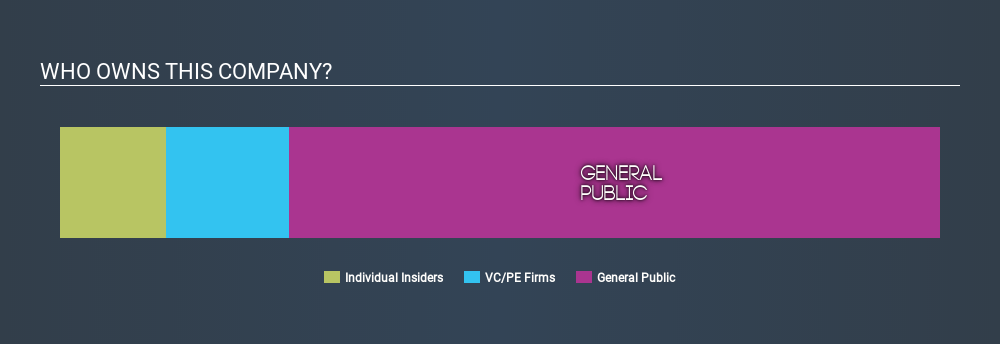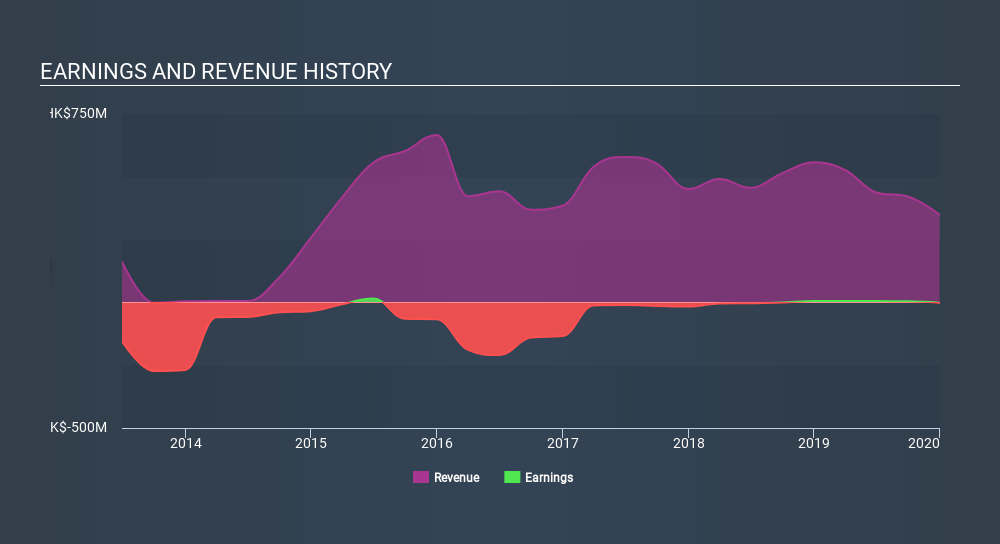- Hong Kong
- /
- Trade Distributors
- /
- SEHK:8009
Do Institutions Own Chinese Energy Holdings Limited (HKG:8009) Shares?

If you want to know who really controls Chinese Energy Holdings Limited (HKG:8009), then you'll have to look at the makeup of its share registry. Generally speaking, as a company grows, institutions will increase their ownership. Conversely, insiders often decrease their ownership over time. Warren Buffett said that he likes "a business with enduring competitive advantages that is run by able and owner-oriented people." So it's nice to see some insider ownership, because it may suggest that management is owner-oriented.
Chinese Energy Holdings is not a large company by global standards. It has a market capitalization of HK$16m, which means it wouldn't have the attention of many institutional investors. Our analysis of the ownership of the company, below, shows that institutions don't own shares in the company. Let's take a closer look to see what the different types of shareholder can tell us about Chinese Energy Holdings.
View our latest analysis for Chinese Energy Holdings

What Does The Lack Of Institutional Ownership Tell Us About Chinese Energy Holdings?
Small companies that are not very actively traded often lack institutional investors, but it's less common to see large companies without them.
There are multiple explanations for why institutions don't own a stock. The most common is that the company is too small relative to fund under management, so the institition does not bother to look closely at the company. Alternatively, there might be something about the company that has kept institutional investors away. Chinese Energy Holdings's earnings and revenue track record (below) may not be compelling to institutional investors -- or they simply might not have looked at the business closely.

Hedge funds don't have many shares in Chinese Energy Holdings. The company's largest shareholder is Hony Capital (Beijing) Co., Ltd., with ownership of 14%, With an ownership of 12%, the second largest shareholder is Haining Chen, who also hold the title of Chief Executive Officer.
A deeper look at our ownership data shows that the top 2 shareholders collectively hold less than 50% of the register, suggesting a large group of small holders where no one share holder has a majority.
While it makes sense to study institutional ownership data for a company, it also makes sense to study analyst sentiments to know which way the wind is blowing. As far I can tell there isn't analyst coverage of the company, so it is probably flying under the radar.
Insider Ownership Of Chinese Energy Holdings
The definition of an insider can differ slightly between different countries, but members of the board of directors always count. The company management answer to the board; and the latter should represent the interests of shareholders. Notably, sometimes top-level managers are on the board, themselves.
Insider ownership is positive when it signals leadership are thinking like the true owners of the company. However, high insider ownership can also give immense power to a small group within the company. This can be negative in some circumstances.
Our most recent data indicates that insiders own a reasonable proportion of Chinese Energy Holdings Limited. It has a market capitalization of just HK$16m, and insiders have HK$2.0m worth of shares in their own names. This may suggest that the founders still own a lot of shares. You can click here to see if they have been buying or selling.
General Public Ownership
The general public, who are mostly retail investors, collectively hold 74% of Chinese Energy Holdings shares. With this size of ownership, retail investors can collectively play a role in decisions that affect shareholder returns, such as dividend policies and the appointment of directors. They can also exercise the power to decline an acquisition or merger that may not improve profitability.
Private Equity Ownership
Private equity firms hold a 14% stake in 8009. This suggests they can be influential in key policy decisions. Sometimes we see private equity stick around for the long term, but generally speaking they have a shorter investment horizon and -- as the name suggests -- don't invest in public companies much. After some time they may look to sell and redeploy capital elsewhere.
Next Steps:
While it is well worth considering the different groups that own a company, there are other factors that are even more important. Case in point: We've spotted 4 warning signs for Chinese Energy Holdings you should be aware of, and 1 of them is a bit unpleasant.
Of course, you might find a fantastic investment by looking elsewhere. So take a peek at this free list of interesting companies.
NB: Figures in this article are calculated using data from the last twelve months, which refer to the 12-month period ending on the last date of the month the financial statement is dated. This may not be consistent with full year annual report figures.
If you spot an error that warrants correction, please contact the editor at editorial-team@simplywallst.com. This article by Simply Wall St is general in nature. It does not constitute a recommendation to buy or sell any stock, and does not take account of your objectives, or your financial situation. Simply Wall St has no position in the stocks mentioned.
We aim to bring you long-term focused research analysis driven by fundamental data. Note that our analysis may not factor in the latest price-sensitive company announcements or qualitative material. Thank you for reading.
About SEHK:8009
Chinese Energy Holdings
Chinese Energy Holdings Limited, an investment holding company, engages in the trading of liquefied natural gas products in the People’s Republic of China.
Flawless balance sheet and good value.
Market Insights
Community Narratives


